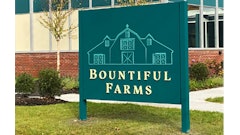
The signature-gathering phase is “going well” for a coalition that’s aiming to put a question before Massachusetts voters that would backtrack on adult-use cannabis legalization by wiping out the state’s licensed industry.
Massachusetts Attorney General Andrea Joy Campbell certified the petition, “An Act to Restore a Sensible Marijuana Policy,” last month, and now the group has until Dec. 3 to collect 74,574 valid signatures from registered voters to have a shot at qualifying for the November 2026 ballot.
The campaign organizers aim to submit more than 100,000 signatures to the secretary of state, providing a cushion in anticipation of the state’s vetting process to ensure the signatures are valid, group spokesperson Wendy Wakeman told Cannabis Business Times.
“The signature phase is going well. It’s on track,” she said. “The whole process, the initiative petition process, isn’t easy. … While we need to collect 74,000 [signatures], we actually have a goal of collecting over a hundred thousand, and that’s because there are two different vetting processes that the signature sheets, the petitions, will go through.”
Local elections officials must review the signatures by Nov. 19 to ensure they’re from registered voters and match what’s on file, before the petitions are filed with Secretary of State William Galvin’s office two weeks later. Galvin’s office will perform the final count and can toss any petition sheets that are incomplete or mutilated.
“The process at every step is political,” Wakeman said, adding that a coalition of parents, doctors, mental health professionals, educators and others is concerned about the negative effects of cannabis, particularly on youth. This concern serves as the genesis of the campaign to effectively end a $1.6 billion retail industry in Massachusetts that has been serving those 21 and older since dispensary sales launched in 2018.
“[They’re looking at] the impact that the growth of marijuana use has had on the quality of life, the increase in DUI stops, the increase in child poisonings and in pet poisonings,” she said. “There’s a group that coalesces around the idea that we moved too far too fast with marijuana legalization, and that it’s not working well for Massachusetts.”
Meg Sanders, CEO and co-founder of Western Massachusetts-based Canna Provisions, argues that the commonwealth rolled out a highly regulated system that helps ensure cannabis is lawfully grown and sold through a tested, tracked and taxed system that voters approved in the November 2016 election.
The attempt to repeal the state’s program and ban home grows wouldn’t remove demand; it would shift cannabis back to an unregulated, irresponsible system for consumers, Sanders told CBT.
“First and foremost, this question has been asked and answered,” she said. “I believe the voters showed up in 2016 and stated exactly what they wanted to see, which was a regulated cannabis market for adults. … I really hope we don’t have to ask and answer it again.”
For Sanders’ part, she’s tackling the initiative petition head-on through a “do not sign” campaign. Sanders also penned a column this month in the Berkshire Business Journal, telling readers that the 2026 proposal would create chaos for town budgets throughout Berkshire County.
With roughly 130,000 residents, Berkshire County represents nearly 2% of the state’s population and is the beneficiary of more than half a billion dollars in taxed cannabis sales.
Licensed cannabis businesses don’t just support some 27,000 industry workers in Massachusetts, but they also support “contractors, bookkeepers, HVAC technicians, drivers, and the restaurants and inns they patronize,” Sanders wrote.
The cannabis CEO said that while politics is not on the initiative petition’s side, she’s hoping industry stakeholders can nip it in the bud before it potentially lands on the ballot.
Under current market dynamics, cannabis businesses have plenty of other fish to fry, Sanders told CBT; however, the 2026 ballot proposal represents a real threat, and licensed adult-use businesses must pull their resources to defeat it, she said.
“I think prohibition in any form is a real threat, and I think we have to keep our eye on the ball and not assume and not just go about our merry way,” she said. “We’ll talk about it with our customers. We’ll make sure that they’re very aware of it. Please ask them to tell their friends. I just feel like we don’t know what the money behind this initiative is. We don’t understand exactly what’s backing this, but in my opinion, any threat to freedom is a threat that we need to look at.”
The initiative petition organizers don’t see it that way.
While Wakeman is now the spokesperson behind the initiative petition to do away with Massachusetts’ adult-use cannabis program, she wasn’t among the 15 Massachusetts residents who signed the proposal that the attorney general certified last month.
Among the signers were four Massachusetts Republican State Committee members, including Caroline Cunningham, David Lunger, Kathleen Lynch and Timothy Smyth. Cunninham, a political consultant, campaign manager and professional fundraiser, aligned with Smart Approaches to Marijuana (SAM) to defeat a psychedelics legalization ballot measure last year in the commonwealth.
In leading the charge to undo adult-use cannabis legalization in Massachusetts, Cunningham told The Boston Globe in August that the “true purpose” of the initiative is to shut down licensed dispensary sales. “The goal is not to arrest people for simple personal possession,” she said.
Under the proposal, possessing up to 1 ounce of cannabis or 5 grams of concentrate would be decriminalized for those 21 and older, and the state’s medical program would still exist. In 2024, medical cannabis sales made up 9% – roughly $162 million – of the state’s overall licensed marketplace, according to the Massachusetts Cannabis Control Commission (CCC).
While the petition would not eliminate medical cannabis dispensary sales, many patients fear that the certified proposal would implement potency caps of 30% THC on medical flower and 60% THC on medical concentrates, as well as prohibit concentrated forms of medical cannabis that fail to provide a metered delivery serving of 5 milligrams of THC with no more than 20 metered doses (100 milligrams) per package.
Those provisions were included in “Version A” of the group’s two certified petitions; however, Wakeman told CBT that the group plans to solely pursue collecting signatures for “Version B,” which does not include the potency caps and metered dose proposals.
“It is not the one with the THC cap,” she said. “We’re focusing on a petition that rolls back recreational pot stores and the legality of home-grown recreational marijuana.”
Also among the 15 petitioners who signed the now-certified proposal was Nassir Ghaemi, M.D., former president of the Massachusetts Psychiatric Society and a professor of Psychiatry at Tufts Medical Center in Boston. He specializes in depression and bipolar illness.
In addition, unsuccessful Brockton mayoral candidate Richard Reid and his wife, Lynn Reid, also signed the certified proposal. Reid, a pastor of the North Baptist Church in Brockton for the past 17 years, has opposed cannabis legalization since adult-use sales first began in the commonwealth. In May 2018, the city council’s Finance Committee invited Reid to discuss his “concerns with the sale of recreational cannabis in the City of Brockton.”
While Massachusetts voters supported legalization in the 2016 election, those pushing the 2026 proposal to end the adult-use program argue that cannabis reform has failed to live up to its promises.
“One of the things we were sold when voting to accept looser cannabis rules was that the black market would go away, and that just hasn’t happened,” Wakeman said. “The black market is still thriving. … We’ve seen a reduction in crime, because we’re no longer punishing the guy who has a dime bag in his pocket or whatever. But in terms of organized crime, corruption and graft, it hasn’t gone away.”
Cannabis industry advocates often argue that some of the largest contributors to the illicit cannabis market are high taxes, municipal opt-outs (cities that ban dispensaries), shortcomings in track-and-trace systems and restrictive state policies such as prohibition.
Some state markets have struggled to rein in unregulated cannabis activity compared to their legalization peers.
New York, for example, has yet to implement a seed-to-sale tracking system nearly three years after launching adult-use dispensary sales. In California, 53% of cities and counties still ban cannabis businesses, and state residents consume nearly twice as much unregulated cannabis as regulated cannabis, according to the state’s Department of Cannabis Control.
Meanwhile, Arizona requires a self-reporting track-and-track model where licensees are free to use their own software systems to report inventory to the state’s Department of Health Services. Most state cannabis programs mandate a third-party software system, such as Metrc or BioTrack, for their seed-to-sale tracking.
Sanders argues that Massachusetts has one of the strictest regulatory structures for its licensed marketplace and that legalization was never meant to completely eradicate the unregulated market.
“What I know for sure in Massachusetts is we use a seed-to-sale tracking method that is required by the state. Every gram has to be accounted for and has to be counted and recounted,” she said. “What I know for sure is that if you eliminate the adult-use market, you will see a massive increase in the illicit market.”
Instead of backtracking on legalization, Sanders encourages awareness of the guardrails surrounding the Massachusetts adult-use cannabis program, from the seed-to-sale tracking system to requirements for age-gating, testing, labeling and childproof packaging.
“I think that’s a really important thing,” Sanders said. “Prohibition doesn’t work. The United States has shown this time and time and time again, and this notion that ‘Oh, we’re just going to reinvigorate the medical program’ is just a fool’s errand. That’s really what they want to do. As I mentioned before, there are many things that they could do with the Legislature and the CCC to make the medical program stronger here in Massachusetts.”
Eliminating regulated and tested adult-use products from the state’s cannabis market would be “terrifying” for consumer safety, she said.



























